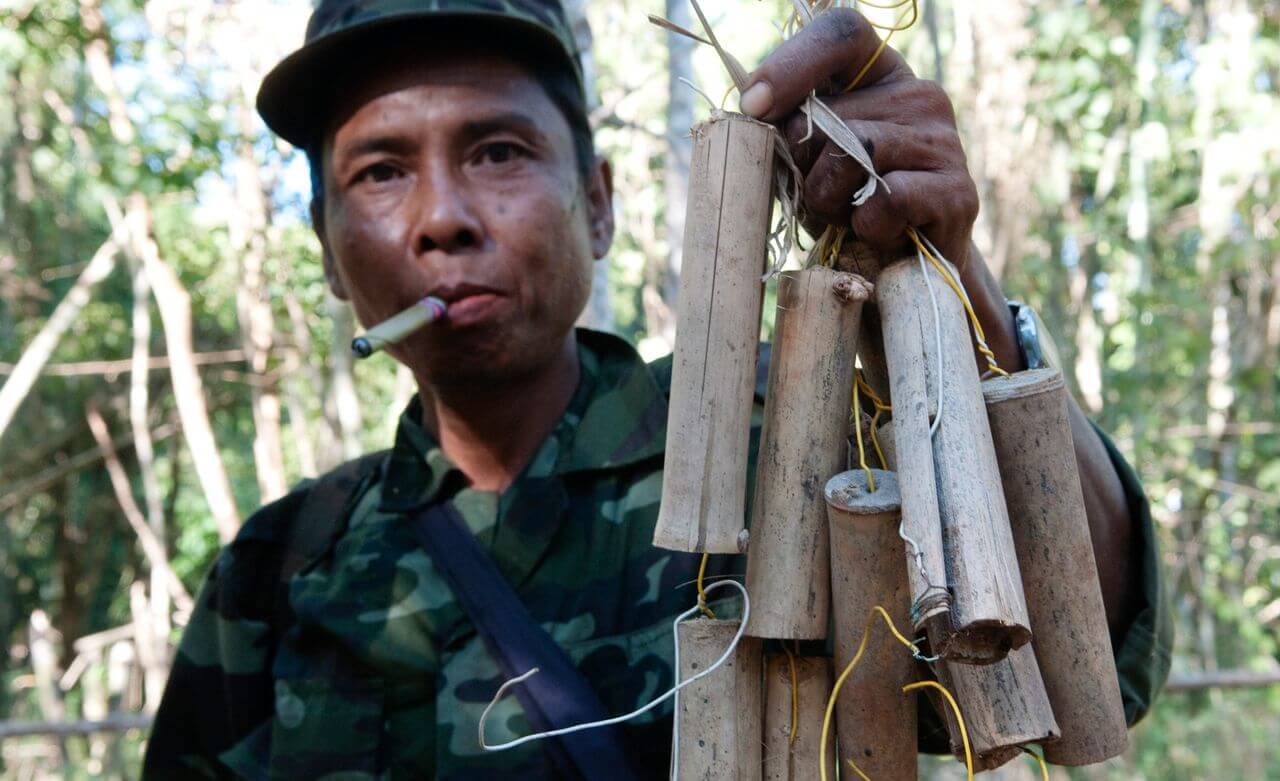Human rights group Amnesty International said today that the Myanmar military’s use of antipersonnel landmines amounts to war crimes.
During an on-ground investigation of conflict-affected parts of the Kayah (Karenni) State, Amnesty discovered that the junta has been laying landmines “on a massive scale in and around villages.” “The landmines laid by the Myanmar military have killed and seriously injured civilians and will have significant long-term consequences, including on displaced people’s ability to return home and to farm their lands,” it said in a press release.
The international non-profit’s International Crisis Response deputy director, Matt Wells, described the junta’s use of landmines as “abhorrent and cruel.” “At a time when the world has overwhelmingly banned these inherently indiscriminate weapons, the military has placed them in people’s yards, homes, and even stairwells, as well as around a church,” he said. Wells also called on the international community to “urgently respond to the military’s atrocities against civilians,” “cut off the flow of weapons” to the Asian nation, and “support all efforts to ensure those responsible for war crimes face justice.”
New @amnesty report out on landmine usage in Karenni. Key takeaways sadly common across 🇲🇲; extensive SAC mining of civilian areas, and that contamination will prevent future farming; food security issues on the horizon. #WhatsHappeninglnMyanmar https://t.co/lAL3VIzSHf
— Matt W (@mattyrwalsh) July 20, 2022
Amnesty’s investigation took place from 25 June to 8 July, during which it interviewed 43 residents in Kayah State’s Demoso, Hpruso, and Loikaw Townships. The locations have been terror hotspots over the past year as the military has clashed with local armed groups. Conflict in the state re-ignited last May after the junta forcefully overthrew the democratically elected government last February.
The organisation gathered its data through interviews with landmine survivors, eyewitnesses, medical professionals who treated landmine injuries, as well as local residents who “had discovered and deactivated landmines in villages.” In addition, researchers also inspected multiple villages that had been recently demined.
There is an urgent need for a comprehensive arms embargo, as well as a scale-up of humanitarian aid. People who cannot plant told us their existing rice supply will run out in the coming months. The world must wake up and engage on #Myanmar. /end pic.twitter.com/KGvZjev3jU
— Matt Wells (@mattfwells) July 20, 2022
The investigation further found that the junta has been manufacturing the landmines on its own. The report noted that its arsenal included the M-14, “which typically blows off the victim’s foot at the ankle,” as well as “the more powerful MM-2, which often blows off the victim’s leg at the knee and causes injuries to other parts of the person’s body, with severe risk of death due to blood loss.” According to the Karenni Human Rights Group (KnHRG), at least 20 civilians were killed or “seriously injured” by landmines in the province since June 2021.
The organisation argued that antipersonnel landmines were “inherently indiscriminate” and stated that their use is a violation of international law. International humanitarian law, as well as the 1997 Mine Ban Treaty, which 164 states are party to, prohibits the use of antipersonnel landmines. According to Landmine Monitor, the Myanmar military is “the only state armed forces confirmed to have used antipersonnel landmines” over the past year.
The country has been mired in crisis after the military took over the government in a coup last February. After Senior General Min Aung Hlaing came to power, many high-level politicians, including State Counsellor Aung San Suu Kyi and President Win Myint, were placed under house arrest. As of June 2022, it is estimated that more than 2,000 people have been killed, 14,000 arrested, and over 700,000 displaced. Meanwhile, ousted democratic leader Suu Kyi currently faces nearly a dozen cases that carry a combined maximum sentence of more than 100 years in prison.
Owing to the junta’s reluctance to transition the country back to democracy, the country has been banned from sending political representatives to Association of Southeast Asian Nations (ASEAN) meetings. In fact, even China, which is known for protecting authoritative regimes, called on the junta to restore peace, stability, and democracy when Foreign Minister Wang Yi visited the country earlier this month.

